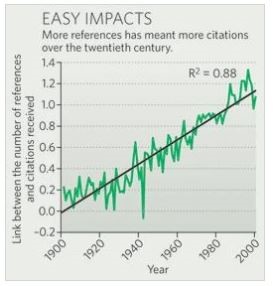Effective ways to Increase the Impact Factor of a Research Paper
Author: Refaad
Date: 04/02/2022
4352The impact factor of scientific research is defined as a measure of the number of times scientific research published in a journal is cited. Impact factors are used as a proxy for the journal's relative importance of research.
This article will explain the best strategies to increase the citation potential of your scientific research.
1. Main keywords: Select from 2-5 keywords that you can use based on your research topic. Then include these words in all parts of the search such as title, summary, and sub-headings, where selecting the right keywords can improve the ability to be discovered while searching for it in search engines and thus increase the number of citations.
2. If you want to get more citations, the answer might be to cite more researchers. [1]
A list of references at the end of a research paper may be key to ensuring they are well cited, according to an analysis of 100-year research papers published in Science.

More references mean more citations, according to an analysis of papers published in Science. Credit: Gregory Webster
3. Publishing in open access journals.
Anyone can download research papers for free and without a subscription, thus increasing the chance of making your research available to researchers and readers, which increases the chances of being cited. Rafaad Journals are an example of this type of journals.
4. Make your search appear more on the Internet.
It is a basic point and many researchers may not attach importance to it. Share your research paper on social media. Also you have to create an account in some important sites like - Google Scholar, Researchgate, Orcid, Mendeley, etc.
5. Citing your previous research papers when it is relevant to your new paper. Don't cite every research paper you've written just to increase the number of citations.
Source:
[1] Corbyn, Z. An easy way to boost a paper's citations. Nature (2010). https://doi.org/10.1038/news.2010.406
